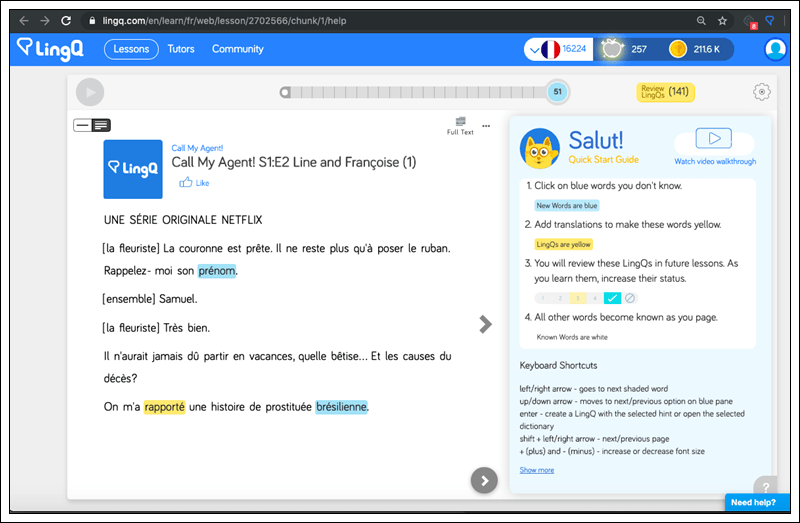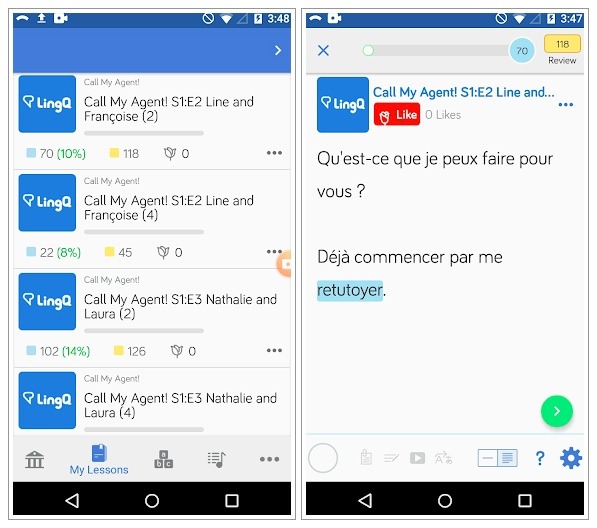The Benefits of using Netflix for Language Learning
Now that you can import Netflix transcripts into LingQ, you’ll have an easier reading through the dialogue in your target language. The benefits of importing your Netflix shows into LingQ are:
a) Ability to look up new words and phrases
b) Save your new vocabulary and review them
c) Read the dialogue on the go using LingQ’s mobile app, giving you more time to study.

Why Netflix and TV are beneficial for language learning
TV shows naturally emphasizes novelty and repetition, and novelty and repetition are two keys in language learning. Once you’ve seen the first episode, the characters, vocabulary and context tend to repeat – repetition – while each subsequent episode develops the scenario and characters incrementally – novelty.
Repetition is key. I recommend watching your show in your target language at least once (with the subtitles on). Afterwards, import and read the lesson in LingQ. This will help reinforce the show’s vocabulary.
For a detailed video on how I learn languages with Netflix and LingQ, click here.
TV and Movies Prepare Language Learners for Real-Life Situations
Although books and podcasts also expose you to a wide-range of dialogue, TV and movies have their advantages.
TV and movies mimic the way the world actually sounds – what I mean is that you’ll constantly hear background noise while you try and listen to the dialogue. This will train your ears to ignore the sirens, the roar of traffic, the slamming of doors, and people speaking over one another.
Like many language enthusiasts, I studied abroad in college. I still remember those first dinners with my host family.
Music blared from the radio. Everyone spoke at once. The baby started crying. Plates clattered. Water boiled.
My host brother asked me a question from six inches away, and I couldn’t understand a word he said. And I’d been studying Spanish for years! If only I had watched TV.
Life is full of background noises that we normally don’t notice. But when you try to understand someone in a foreign language, you suddenly notice that every background noise is competing in your mind with the words that you are struggling so hard to understand.
Beyond the listening itself, TV and movies expose you to the greater context of the language. You learn about cultural norms like greeting with a kiss on the cheek. You see cultural landmarks like the Eiffel Tower. And you start to dream about taking a trip to the country where your target language is spoken.
How to Choose What to Watch: Find the Fun
What’s the best foreign language show for you? Ultimately, the one you enjoy the most. You can check the LingQ forums for suggestions.
If someone tells you not to watch a show because “everyone in that show has regional accents” or “they never use the subjunctive in that show” – Stop. Listening. Now. If the show engages you, watch it.
Language learners who achieve fluency enjoy the process. The learners who succeed are the ones who put in the time every day for years, not the ones who got an A in class or who love to tell you about “the fastest method ever.”
If you keep engaging with the target language, you will achieve fluency. And if you find content you enjoy, engagement will be effortless.
I can’t resist clicking on the TV shows I love in French (my target language) because there’s nothing like hearing a joke in a foreign language and laughing. That laughter, that enjoyment, makes words sink in better than any flashcard ever will. I never force myself to watch TV in French. I do it because it’s fun.
Choose Shows with Lots of Dialogue
If it comes down to two specific shows that you think you’ll enjoy, choose the one with the most dialogue. TV and movies aren’t word dense in the way that audiobooks and podcasts are because much of TV shows are composed of the wordless action between dialogue. (Think of all the action scenes in Bond movies.) Wordless action scenes don’t reinforce vocabulary.
When we read books, all the images that entertain us are born out of the words on the page. If we want to experience the action, we have to imagine it. The words contain the context, the description and the dialogue, so every word carries more meaning. When we watch movies and TV, half the time they’re enjoyable even if we don’t understand everything that’s being said, especially if the movie is simple. That’s why it’s important to read the transcripts because it forces you to have greater concentration therefore improving your vocabulary.
Final tips
If you’re a beginner then watch a show in your target language with the subtitles on in your native language. Then watch it the second time with the subtitles in your target language. This makes it that much easier the second time through because you know what is going to happen, and you don’t fear getting lost. Import the dialogue into LingQ and go through your lesson at least once.
Soon, you’ll be watching your favorite shows, in your target language, with no subtitles at all. Good luck.

